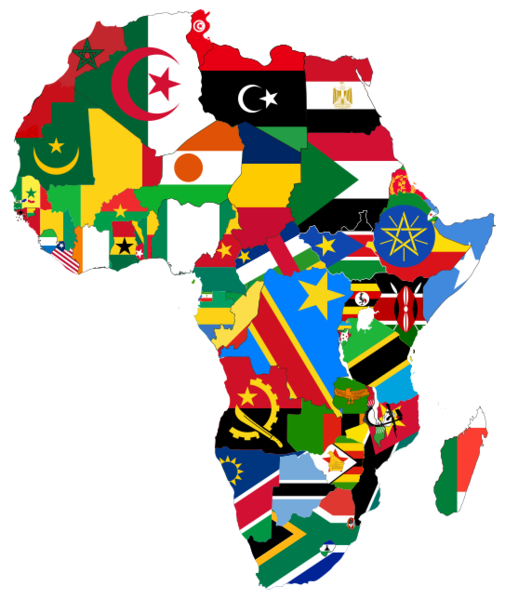 Photo Courtesy of AMODDO on Wikimedia Commons
Photo Courtesy of AMODDO on Wikimedia Commons
Russia’s Return to Africa
Leaked documents obtained this week by the London-based Dossier Center reveal intense Russian efforts to cultivate relationships with African countries. The methods include political consulting, campaign financing, business deals, and military cooperation.
The documents reveal specific strategic objectives in 13 countries, as well as an overarching goal to revitalize “pan-African consciousness,” an idea that parallels Putin’s popular “Russian world” vision of extending Russia’s cultural and political power beyond its border.
The mission is led by Yevgeny Prigozhhin, a St. Petersburg businessman with close ties to Putin. Prigozhin was indicted by Mueller in 2018 due to his involvement in the troll factory that was active in the 2016 presidential election. Prigozhin is also connected to The Wagner Group, a private military contractor which supplies mercenaries to aid Russian efforts in Ukraine and Syria. In the summer of 2018, three journalists working for a private media outlet headed by Putin critic Mikhail Khodorkovsky travelled to the Central African Republic (CAR) to investigate the Wagner Group’s activities there. They were murdered under suspicious circumstances before the results of their investigation could be published.
Cold War Echoes
Putin’s efforts to strengthen relations with African countries bear distinct parallels to Cold War-era strategy. During the heyday of the Soviet Union, Africa was considered a zone of Soviet power, with the USSR supporting nationalist and communist uprisings throughout the continent. Moscow backed insurgencies and guerrilla-led revolutions in the Democratic Republic of the Congo, Algeria, and Angola. Africa was a vital zone of proxy conflict at this time, a region where the great-power drama of West vs. East played out uniquely as both the United States and the USSR vied for influence among developing nations.
Economic Motivations
While the Soviets’ interest in Africa was driven by the Cold War’s bloc-building strategy, the Kremlin today sees multiple opportunities in cultivating relationships with African countries. Perhaps most important is the economic potential. Western sanctions imposed after the 2014 annexation of Crimea have forced Russia to seek out new markets, as well as new trade partners. Africa seems like a promising choice.
Russian economic interests in Africa were most recently highlighted by activity in Madagascar, a country that is rich in mineral reserves such as uranium, cobalt, and nickel. In April 2019, BBC uncovered a Russian plot to influence Madagascar’s presidential elections; Russian political agents worked undercover for nearly a year, posing as tourists and attempting to sway election results through bribery. They offered at least six (out of thirty-five total) candidates large sums if the candidates promised to halt their campaigns. The candidate who eventually won, Andry Rajoelina, has denied receiving any kind of Russian support.
Besides this type of financial manipulation (which Russia employs all over the globe, most recently in Italy), the Kremlin is also reverting to more classic tactics to win over African leaders. In order to develop economic ties, Russia is using a mix of public and economic diplomacy. The creation of Russian-backed NGOs, as well as media projects (such as the news service Afrique Panorama) attempt to spread Russian soft power throughout African countries by targeting the population at large.
Economic diplomacy aims to set up trade relationships with top-tier representatives of strategic African countries. The Kremlin has already taken big steps in pursuit of this goal. The first Russia-Africa summit is scheduled for October of this year. The summit, co-led by Putin and Egyptian President Abdel Fatah al-Sisi, will take place in Sochi. 50 African nations have already confirmed their attendance and will send delegations comprising of both political and business elites.
Military Influence
Russian attempts to strengthen military cooperation with African countries displays a return to the Cold War-era mindset. The Soviet Union exported arms and equipment to African countries in an attempt to oppose Western influence on the continent. Today, a similar strategy seems to be playing out yet again. Central African Republic is a perfect example. The Soviet Union supported CAR in the 1960s-70s, before the self-crowned emperor was overthrown in 1979. Now, Russian influence has returned in the form of arms sales, training camps, and U.N.-approved missions.
In May, Putin announced that he was sending military specialists to Democratic Republic of the Congo, to service Russian-made military equipment sent earlier. While this type of activity is considered benign, top U.S. military leaders have expressed concern about Russia’s long-term goals in the continent. They fear that economic and especially military support comes with “a whole lot of strings attached,” increasing the risk that African countries will become indebted to Russia.
As Russia attempts to shape itself into African countries’ strategic partner both economically and militarily, the question of waning American influence looms large. Furthermore, if Russia succeeds in its quest to win over Africa as a loyal supporter, key votes in forums such as the U.N. could shape the direction of the international community towards Putin’s agenda.






